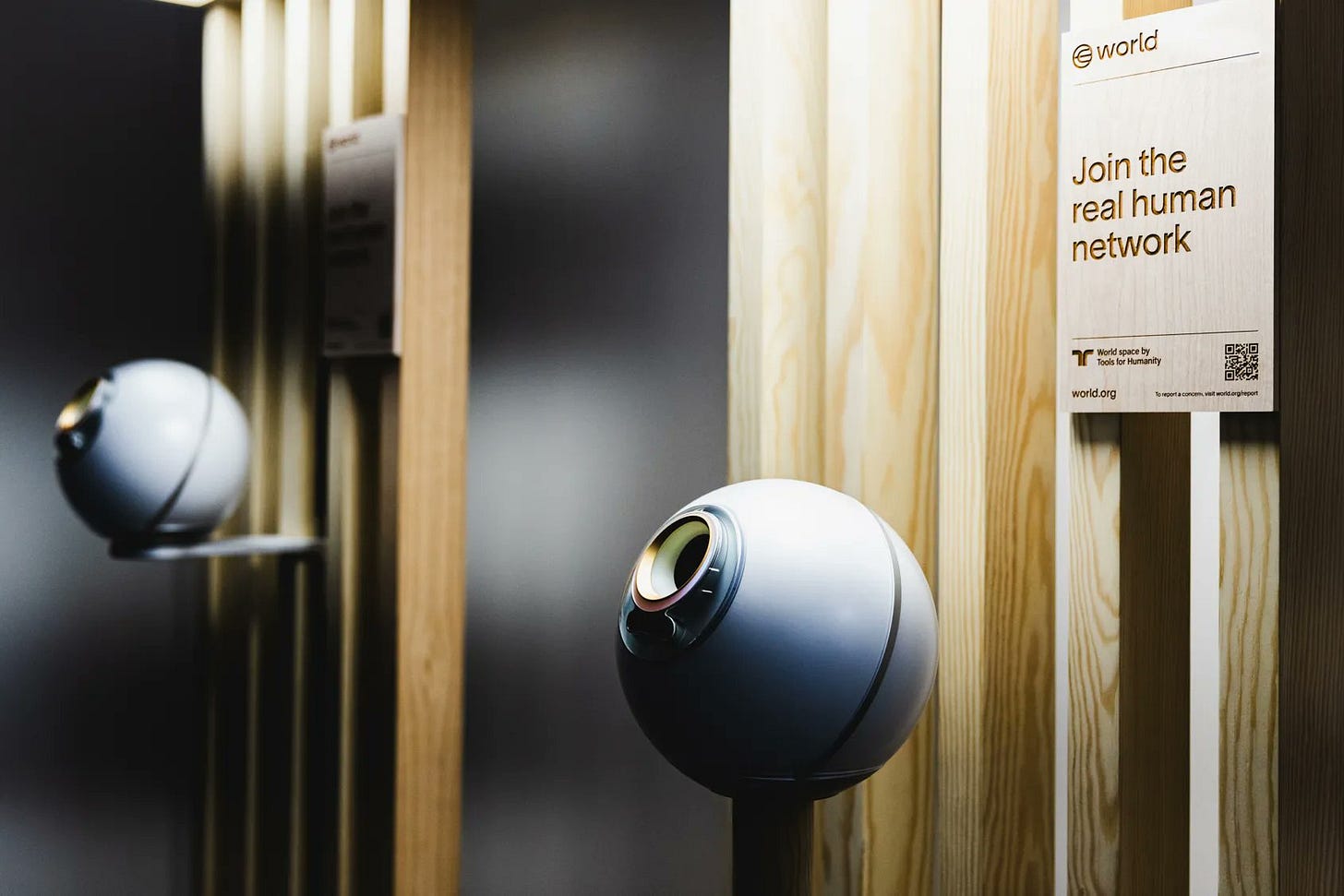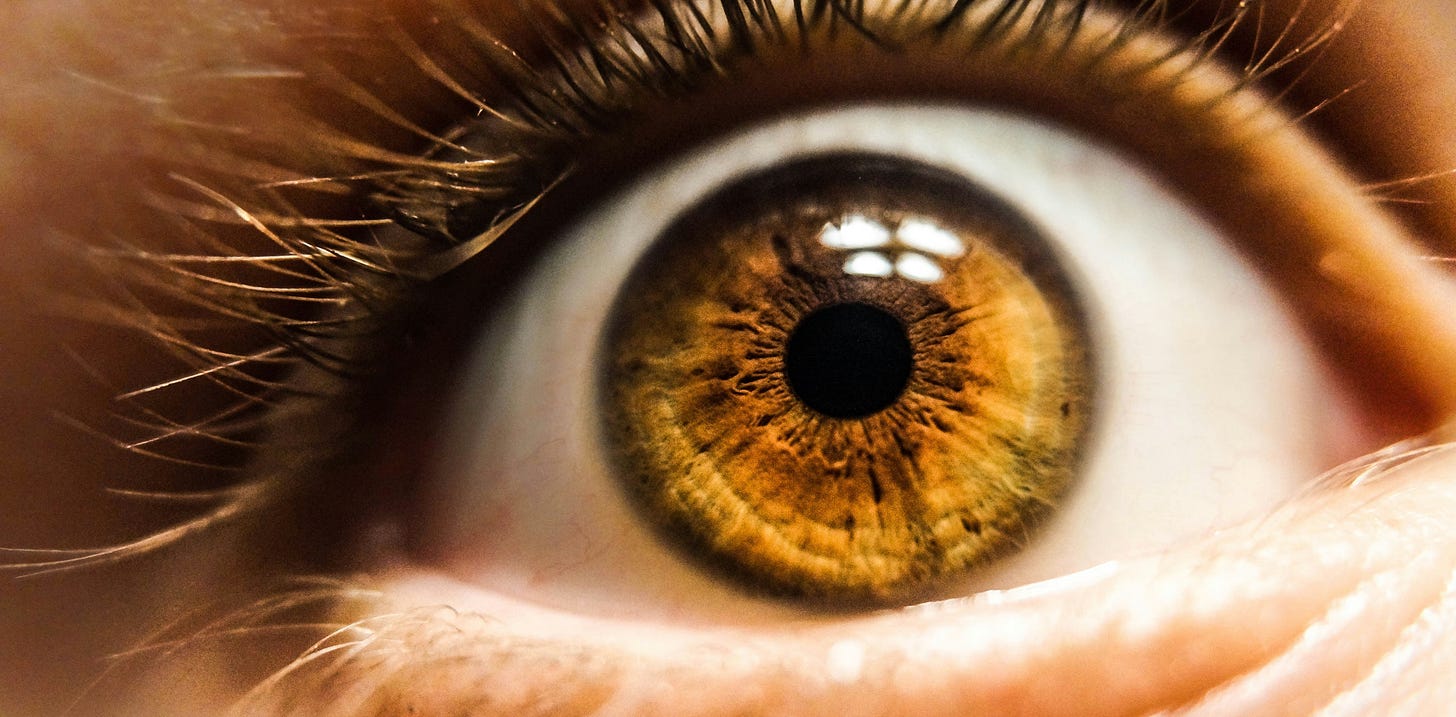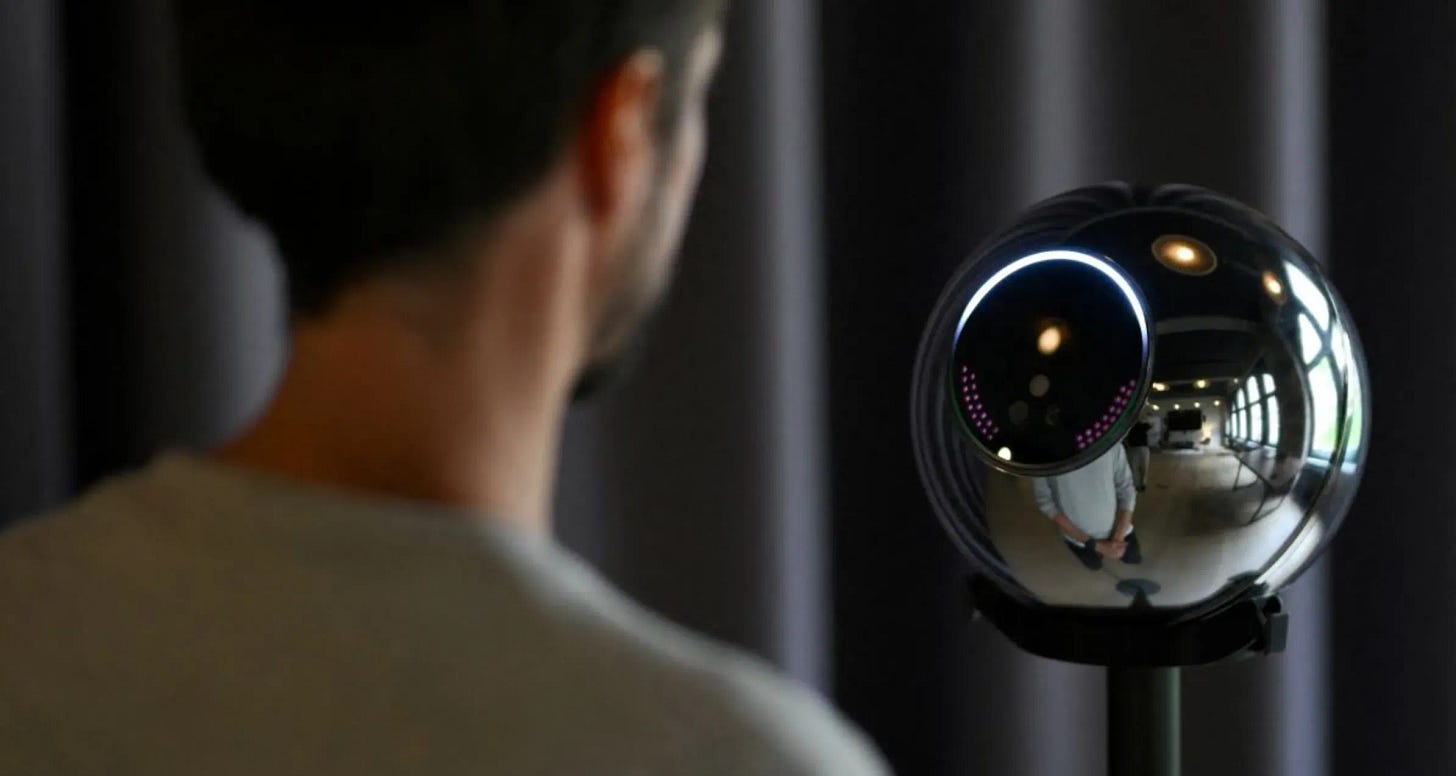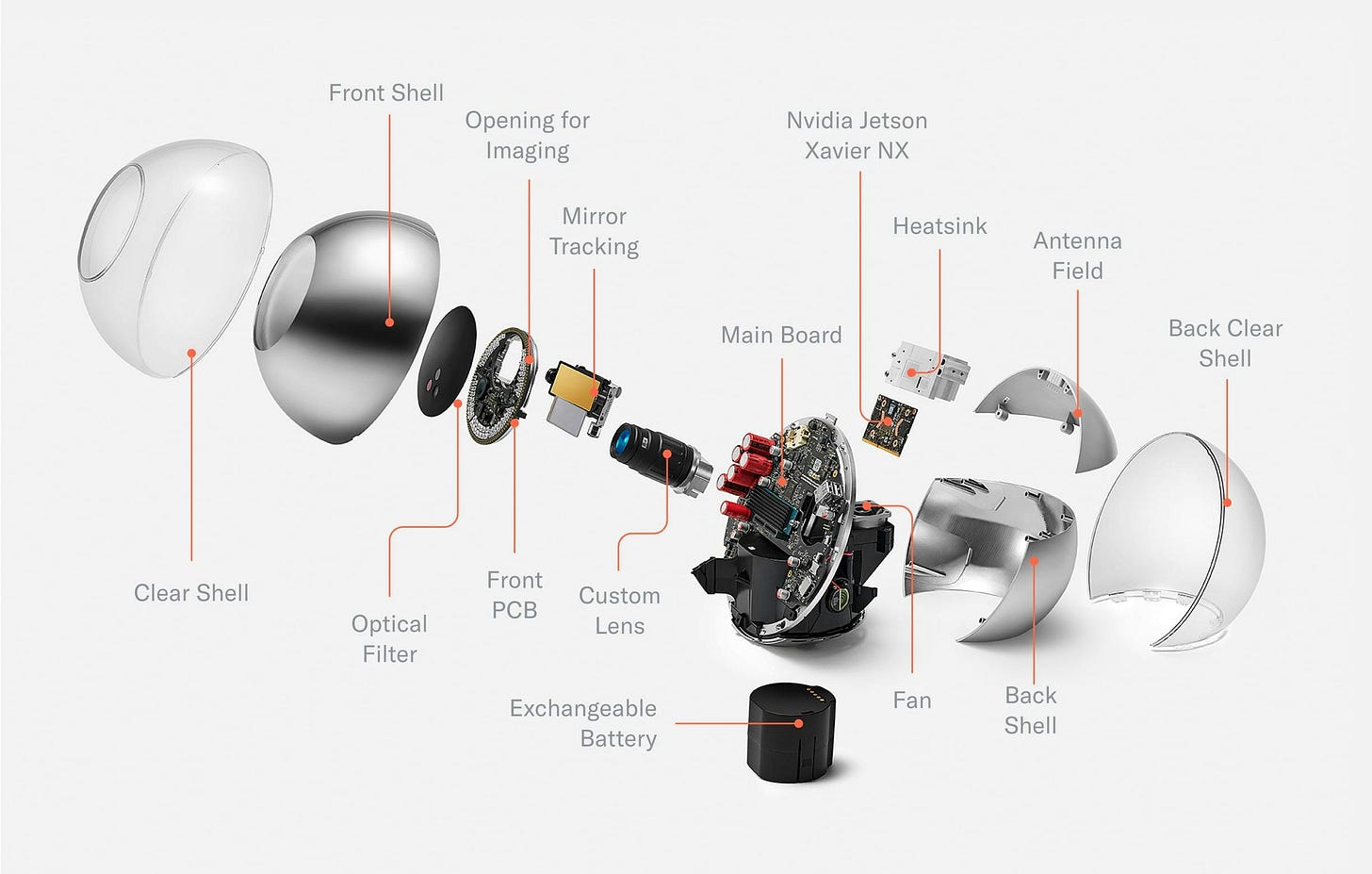Human or Bot?
Verifying humans in the age of AI
This is Startup Pirate #122, a newsletter about technology, entrepreneurship, and startups every two weeks. Made in Greece. If you haven’t subscribed, join over 6,900 readers by clicking below:
Human or Bot?
Today’s newsletter guest is Anastasios Andronidis, Senior Staff Software Engineer at World, a new kind of digital infrastructure to verify humans in the age of AI. Since 2019, the project has raised close to $400 million. Hang on, as we'll delve into the specifics in a minute. With Anastasios, we also chatted about internships (he has interned seven(!) times in his career at places like Microsoft, Box, CERN, etc), how AI is changing the game for young engineers, and more.
Alex: We've got a packed agenda today. You're deeply involved in creating a technology described by co-founder Sam Altman as aiming to "uniquely identify and authenticate humans in the age of AGI." What exactly is World, and why do we urgently need a technology that verifies humans?
Anastasios: Imagine scrolling through Facebook or Reddit and finding a post with thousands of likes. How many of those reactions come from unique, real people, and how many from one malicious actor wielding a swarm of fake accounts to sway your opinion?
Over the past decade, artificial intelligence has leapt forward. Machines can now think, reason, and even outperform human experts. Each new AI benchmark is quickly surpassed. Systems that write and speak like people already exist, making it harder than ever to know whether what you read, watch, or hear online was created by a person or by AI.
Soon, advanced AI will gain agency: it will not only answer prompts but also act autonomously in the world. Although powerful and helpful, this capability can be abused. Picture your personal AI assistant calling a restaurant to reserve a table. Convenient. Now imagine someone unleashing dozens of assistants to book every table and hurt that restaurant’s business. To prevent such abuse, AI agents must prove they act for a single, real human.
Until now, we fought fraud with passport or national ID checks (KYC), a process that excludes many people and exposes private data. This is why in 2019, Sam Altman and Alex Blania launched World (formerly Worldcoin) to solve this in a more inclusive, privacy‑first way. World is building a human‑verification layer for the internet—World ID—that uniquely distinguishes real individuals from bots and AI agents.
Think of World ID like a Google or Facebook login, but with one crucial twist: you can have only one World ID. Clicking “Sign in with World ID” lets any online service confirm that each account belongs to one real person while protecting that person’s privacy. World doesn’t know where, when, or how you use your World ID, and the services you log into can’t tell that you’re the same user elsewhere.
World has already partnered with Razer (gaming) and Match Group (dating), allowing users to sign in with World ID to curb cheating, scams, and bots.
But how do you uniquely distinguish nine billion humans in an inclusive, private and spoof-resistant way? Traditional IDs aren't inclusive, as many people worldwide lack passports or credit cards, especially in rural or underserved regions. And these IDs can now be convincingly faked with AI. Face can be easily manipulated with makeup and beards. Fingerprints are not that inclusive, people who do intense manual labour lose their fingerprints over time.
World solves this by turning to your iris. The intricate, stable patterns in the iris are widely regarded as the gold standard in biometric security. By choosing iris scanning, World provides a simple yet highly robust way to verify each person once—and only once.
Privacy is foundational. World is building an open‑source, privacy‑first digital identity backed by zero‑knowledge proofs, anonymous multi‑party computation, and zero‑knowledge machine learning. Unlike mainstream login providers such as Google or Apple, World never tracks which online services its users access.
Alex: Can you walk me through exactly how verification works? If I’m not mistaken, the company claims to have verified 13 million people worldwide so far.
Anastasios: Happy to delve into the nitty-gritty technical details, as I have developed a significant portion of this. We use the Orb, an IoT device with the shape of a sphere about the size of a beach ball. The Orb houses multiple high‑definition, multispectral cameras and runs several neural networks locally to confirm you are a live human (though not a unique one) through liveness tests that resist makeup, photos, masks, contact lenses, and others. You simply look into the lens; within seconds, the device converts the captured images into an iris code, a numerical abstraction of your iris texture. We ensure the entire process is secure, completely local to the Orb and implements strong anti-spoofing and anti-tempering measures. I highly recommend that the curious readers look at our paper for more information.
The encrypted iris code is then transferred—end‑to‑end encrypted—to your phone, where you remain the sole data owner. The World App derives three unlinkable shards from the code and sends them to an Anonymous Multi‑Party Computation (AMPC) network run by three independent universities. None of these shards, on their own, can be linked back to the original iris code. The AMPC merely checks whether the combination already exists; if it does, registration is refused to enforce “one‑person‑one‑ID.”
In essence, the AMPC is a distributed encrypted database that checks if your Iris code has already been registered. The AMPC is split into three and operated by different universities. This system represents a significant innovation from our side, setting a new standard for privacy and security that no other company has achieved.
If the AMPC has no entry for your Iris code, then it allows you to register a unique World ID on the Ethereum blockchain. It is important to highlight that the AMPC doesn’t know which World ID you are registering on the blockchain, and this is how we guarantee that your Iris code information is completely independent of your World ID account. What this amounts to is a network of verified users tied to wallet codes rather than real names and a database filled with hashes rather than actual iris or other biometric photos.
When the registration is done, some Worldcoin tokens (World’s native cryptocurrency) are automatically transferred to your digital wallet as a reward for becoming a verified human.
If you were to use your World ID to access a website, that site would learn nothing about you except that you’re human (utilising zero-knowledge proofs). World also has no way to find where and when you have used your World ID, and lastly, different websites that you use your World ID cannot know that you are the same person across different services. The Orb is open-source and open-hardware, so outside experts can examine its code and verify our privacy claims. You can find more information about our audits here.
Alex: Why integrate a cryptocurrency into an identity network? How do identity and finance intersect here?
Anastasios: We believe a global network of verified humans shouldn't be controlled by a single entity, should be permissionless and self-sustainable. Cryptocurrency decentralises control, enabling community ownership. As a matter of fact, other companies can contribute to the development of the network, even build their own Orbs. Though still early, we are exploring how Worldcoin token holders will collectively govern the network, with each person holding equal voting power, regardless of the quantity of tokens held, ensuring genuine democracy through our unique verification process.
Alex: How do you feel about the criticism you have faced over the years? I believe the company has already been suspended from using the Orb in certain countries due to allegations of regulatory violations. Is it a peek into the future or a scene straight out of Black Mirror (British sci-fi TV series)?
Anastasios: World is a new primitive, something that has never been built before. While we open-source our technology so that everyone can examine the validity of our claims, understandably, some people (regulators included) don’t understand the technical details, and of course, on our side, we also need to communicate all this complexity better. Numerous clickbait articles online further fuel the confusion.
This happens with every new technology, right? Some level of criticism is always helpful, of course, and we take constructive feedback seriously. Yet, I’m proud that we've ignited critical conversations on privacy-first identity verification. These conversations are important for our future as KYC with sensitive information doesn’t scale, and it’s incredibly dangerous when data is leaked.
Alex: I want to shift gears before we wrap this up. You’ve had a fascinating journey from CERN to PhD to Big Tech to founding a startup before joining World as employee #50. Where would the 22-year-old Anastasios start from today?
Anastasios: I come from a small village near the city of Serres, in northern Greece. I attended music school in Serres and then went on to the Aristotle University of Thessaloniki. I’m very grateful for the opportunities the tech industry gave me as a software engineer in the 2010s and 2020s.
Nevertheless, I’m concerned that future computer science grads won't have the same chances. The advent of AI has already shrunk the pool of traditional available job openings for junior engineers and interns, and I expect things to get worse, given the leaps of progress AI is making. I receive the same feedback from engineering managers across big tech and startups: AI development tools have effectively replaced a significant portion of the work they used to assign to junior engineers.
Before I sound like a doomer, I want to highlight that AI is actually reshaping these traditional roles to something new. Writing code is not anymore the privilege of the elite. With AI, coding is a commodity. So now, to be a good engineer, you need to employ new attributes to yourself.
In that environment, I urge university students to work on side projects to stand out when the time comes to apply for their first jobs; Arduino projects, websites, etc. In the digital economy of the future, where we’ll rely even more on AI, employers increasingly prioritise creativity, entrepreneurial and doer mentality over academic credentials.
Alex: You’ve done a fair number of internships in your career :) Microsoft, Box, Facebook, CERN, etc. What’s the best way to structure an internship to make it useful for both the intern and the employer?
Anastasios: Yes, I was a professional intern early on — I’ve completed seven internships! AI hasn't fully overtaken human contribution yet, so internships still remain invaluable. There are several side quests we can assign interns to, which are not on the critical path of workstreams but are valuable enough to serve as a win-win for the intern and the employer.
I prefer 6-month internships, which give ample time for the intern to onboard, learn new skills, and deliver tangible results. At World, I've personally hired seven interns from Greece. I guide them by setting the vision and direction, rather than handing out rigid task lists, creating an environment where they learn to think like entrepreneurs and product-minded engineers instead of just technical coders. I’ll soon be opening another intern role, so frequently check our careers page: world.org/careers.
Alex: That was fantastic. Thank you so much.
Anastasis: Appreciate it, Alex.
Jobs
Here’s the list of startup jobs in Greece
News
We got a fair number of Seed rounds last week:
$5.5m for Typedef (generative AI workloads) led by Pear VC.
€2.1m for Billys (property management) by Deep Capital Group, Genesis Ventures, Lambda Development, and others.
€1.05m for Plan(e)t Foods (plant-based food) by Sporos Platform.
€1m for Koios Care (AI & digital biomarkers for Parkinson’s) led by Evercurious VC.
€1m for Bitloops (AI coding tool) led by Eleven Ventures.
€1m for Mobito (mobility data) by Loggerhead Ventures, Sporos Platform, and others.
€600k angel round for Tasteat (food delivery for travellers).
€420k for commerce platforms MomCycle & StyleCycle by Sporos Platform.
Plus, a new fintech-focused solo GP fund Rerail with a $20m size, and an $8m Series A round for clean energy marketplace Station A. There was also a strategic investment in technology services Moro Technology by the Toyota Group.
Resources
Building a defence prime to protect Europe in the era of autonomous warfare w/ Dimitrios Kottas, founder & CEO of Delian Alliance Industries. btw, Delian is hiring for several roles across Athens & London, check them out here.
A fascinating fireside chat w/ Anastasis Germanidis, co-founder & CTO of Runway, on building the most successful AI media company of our days.
Elasticsearch and remote work w/ Panagiotis Moustafellos, Distinguished Engineer at Elastic.
Challenging the status quo in shipping w/ Antonis Malaxianakis, founder & CEO of Harbor Lab.
Taking a student project to Hollywood and the story of Krotos w/ Orfeas Boteas, founder & CEO of Krotos.
From 0 to 30 million users and the journey of Schoox w/ Lefteris Ntouanoglou, founder & CEO of Schoox.
Building Greece's DARPA by The Greek Analyst.
Dealing with tech due diligence by Christos Chatzis, Sr Technology Manager at Kaizen Gaming.
The beauty of vertical SaaS w/ John Melas-Kyriazi, founder & CEO of Standard Metrics.
Events
Building Less-Code and Real-Time Applications with Cognibase by Thessaloniki .NET Meetup on Jun 20
Mergers & Acquisitions Summit by Money Review on Jun 23
Automating EC2 Lifecycle Management with Terraform & AWS Systems Manager by AWS User Group Thessaloniki on Jun 24
Scale-up Greece meetup presenting Hack The Box on Jun 25
Elixir.Greece.thessaloniki/1 on Jun 26
Founders Arena by EnvolveXL on Jun 26
Automation and AI & Become a Quality Leader & Vitest Ministry of Testing Athens on Jun 26
Συνάντηση 2025.06 by Athens Python Users Meetup on Jun 26
MIT Universal AI Summit on Jul 8
That’s all for today. Find me on LinkedIn or X.
Back in your inbox in two weeks with more Greek tech stuff.
Thank you for reading.
Alex





